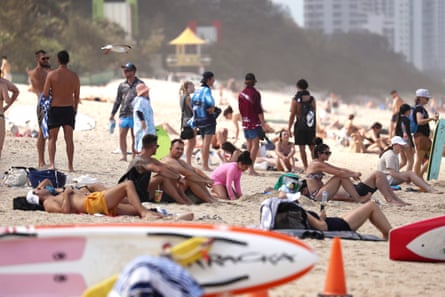“Literally no places available!” says Michel von Düsterlho, a 26-year-old backpacker from Germany, of his hostel search.
Arriving in Australia on a Working Holiday Maker (WHM) visa, Von Düsterlho has been followed for decades by young travelers for its sunny climate, golden beaches and easy work opportunities. I’m on my way.
In 2019, the WHM scheme attracted more than 300,000 travelers, making it Australia’s second largest tourism market by spending after China.
But as backpackers return after the pandemic lockdown, they’re facing massive surges in travel and accommodation as the country’s tourism industry recovers from Covid.
In 2020-2021, many accommodations, especially backpacker accommodations, have closed, leaving fewer places for travelers to stay.
YHA Australia chief executive Paul McGrath said: “We’ve seen capacity declines across the broader hostel market, with more than half of our facilities gone in some areas. While 19 YHA properties have been permanently closed, Nomad Hostels owner Tourism Adventure Group has closed or sold six of its 16 properties in Australia during the pandemic. Prices have gone up by almost 50%.
A far cry from the barefoot, self-paced lifestyle that draws so many travelers to Australia, backpackers report housing stress and rethinking plans. is almost impossible, it makes me very anxious,” says Hanna Storm from the Netherlands. She now books at least two weeks in advance to save her money and find better rated accommodation. “I was thinking of doing a road trip, but I have to pay for accommodation along the way, and given the fuel costs at the moment, I’m not sure it’s feasible.”
Beth Stone learned the hard way about the dangers of last minute bookings. “I paid £100 [$180] Stay overnight in a 100-bed dormitory at Surfers Paradise! It was the second place he went after arriving, but he didn’t book in advance. It was either the place or a place with no reviews at all. ”
India Taylor, who works as a receptionist at a Byron Bay hostel in exchange for accommodation, says her job is to basically turn people down because the hostel is full. Conditions at some other hostels were terrible,” she says. “But the owners know they can get a reservation anyway, so they can get away with it. There is no incentive to improve.”
K’Dee Melfi started his round-the-world trip in January and spent the last month in Australia. She knew it would be more expensive than other countries she had visited, but she was still surprised. She says even places with bad online reviews of her “few places are available because everyone is desperate.” She said, “It was actually cheaper to book a serviced apartment. [in Melbourne] Share with 3 people rather than staying in an 8 bed dorm room. ”
Other backpackers report having to couch surf between bookings to avoid paying unreasonable prices. I had to find a job much sooner.
The price hike hasn’t stopped travelers from coming to Australia, thanks to a huge appetite for travel.Airlines and accommodation providers report strong demand over Christmas and the summer. Searches for accommodation on travel website Kayak increased by a whopping 127% in September 2022 and he in October compared to the same period in 2019, while domestic airfares in Australia have fallen since 2004. Reaching heights never seen before.
YHA, like many hostels, increases prices when demand increases, so prices may not have peaked yet. McGrath believes arrivals will increase in the coming months as air fares drop and international travel stabilizes.
There are still tens of thousands of travelers who have obtained WHM visas but have not yet entered Australia. McGrath suspects they are waiting for cheaper flights.
YHA is now focused on expanding its appeal to customers who are willing to pay higher prices. They are experimenting with coworking spaces inside hostels. With the rise of digital nomads, McGrath believes the traditional image of backpackers has become obsolete.
“Now I joke with my buddies when backpackers come in with Prada suitcases…the concept of working holiday makers is changing and we are changing to reflect that.”
Despite the cost, few people regret traveling to Australia. Von Düsterlho says:

